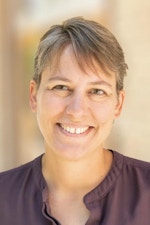Dr. Beth L MacDonald

- About
- Education
- Awards & Honors
- Selected Research
Biography
Beth L. MacDonald is an associate professor in Early Childhood Mathematics Education in the School of Teaching and Learning at Illinois State University. After completing a Bachelor of Arts degree in Studio Art and Elementary Education (PreK-6) at SUNY Potsdam, Beth taught elementary school for 15 years and served as a K-5 Instructional Specialist for two years in southwest Virginia. In this time, Beth taught in fully inclusive elementary classrooms within Title 1 schools and within all K-5 grade levels. While teaching, Beth completed her Master of Arts in Education degree, with a focus on K-8 Mathematics Education and her Doctor of Philosophy degree, with a Curriculum and Instruction concentration and focus on Mathematics Education, both from Virginia Tech.
Current Courses
TCH 268.001 Teaching Early Childhood Mathematics I
TCH 268.002 Teaching Early Childhood Mathematics I
TCH 275.001 Teaching Early Childhood Mathematics II
Teaching Interests & Areas
After working in K-5, Dr. MacDonald worked as a clinical instructor and adjunct instructor at Virginia Tech and Radford University, respectively. Following the completion of her Ph.D., Dr. MacDonald worked as an Assistant and Associate Professor at Utah State University. From these experiences, Dr. MacDonald has taught 22 different higher education courses (undergraduate, masters, doctoral) in PreK-16 Mathematics Education.
Research Interests & Areas
Dr. MacDonald's research interests include students' cognition and learning, and teachers' professional development in mathematics education. Dr. MacDonald's research broadly focuses on PreK-5 students’ development of number, particularly with subitizing activity at the center of this development. Moreover, Beth collaborates often with colleagues who examine teachers’ specialized content knowledge development in mathematics/STEM and collaborates with colleagues who examine marginalized students’ number understanding development. Beth also served as a lead guest editor for Special Issue for the Education Sciences Journal, focusing on STEM in Early Childhood Education (https://www.mdpi.com/journal/education/special_issues/STEM_in_Early).